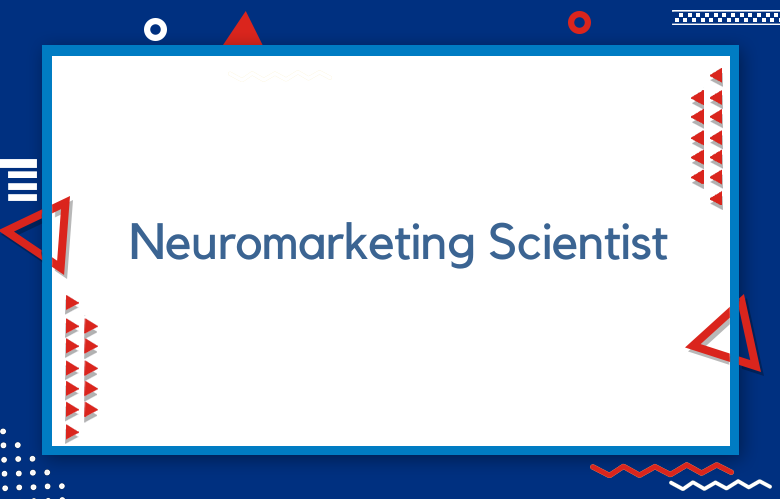Neuromarketing Scientist: Understanding Consumer Neuroscience

The Neuromarketing Scientist represents a fascinating fusion of marketing expertise and neuroscience, delving into the intricacies of consumer behavior from a neurological perspective.
This emerging field, known as consumer neuroscience or neuromarketing, leverages advanced technologies like fMRI (functional Magnetic Resonance Imaging), EEG (Electroencephalogram), and eye-tracking to uncover the subconscious preferences, reactions, and decision-making processes of consumers.
Neuromarketing Scientist: Understanding Consumer Neuroscience
By understanding the neural mechanisms that underpin consumer responses to marketing stimuli, neuromarketing scientists can offer invaluable insights that transcend traditional marketing research methods. They explore how different elements of marketing—be it product design, branding, advertising, or sensory experiences—resonate at a neurological level, influencing emotions, attention, memory, and, ultimately, consumer choices.
The work of a neuromarketing scientist involves designing and conducting experiments that measure neural and physiological responses to marketing stimuli, analyzing the data to decipher patterns and correlations, and translating these insights into actionable marketing strategies.
This might include identifying the most engaging aspects of an advertisement, understanding the emotional impact of brand elements, or determining the optimal sensory cues for product experiences.
In navigating the complex interplay between brain, behavior, and marketing, neuromarketing scientists must also navigate ethical considerations, ensuring that research and applications respect consumer autonomy and privacy. As the field continues to evolve, the neuromarketing scientist’s role becomes increasingly pivotal, offering a deeper, science-backed understanding of consumer behavior that can drive innovation and effectiveness in marketing strategies.
- Key Takeaways
- Understanding Neuromarketing Basics
- Consumer Neuroscience Psychology Insights
- Neuromarketing Professional Skills Development
- Neurophysiology and Biometric Techniques
- Challenges and Solutions in Neuromarketing
- Benefits of Applying Neuromarketing Strategies
- Latest Research Trends in Neuromarketing
- Educational Pathways and Career Opportunities
- Building a Future in Neuromarketing Science
- Summary
- Frequently Asked Questions
- What is neuromarketing, and why is it important for businesses?
- How can professionals develop skills in neuromarketing?
- What are the benefits of applying neuromarketing strategies?
- What are some challenges faced in the field of neuromarketing?
- How can individuals pursue a career in neuromarketing science?
In the realm of marketing, the role of a neuromarketing scientist is pivotal. By delving into consumer behavior through the lens of neuroscience, these experts unlock powerful insights that drive impactful marketing strategies.
With a deep understanding of how the brain responds to various stimuli, neuromarketing scientists decode consumer preferences and motivations with precision.
Their work goes beyond traditional market research, tapping into the subconscious to reveal what truly resonates with audiences. Through cutting-edge technologies like fMRI scans and eye-tracking devices, they uncover hidden drivers of consumer decision-making, revolutionizing the way brands connect with their target market.
Key Takeaways
- Understanding the basics of neuromarketing can provide valuable insights into consumer behavior and decision-making processes.
- Developing professional skills in consumer neuroscience psychology can enhance your ability to create effective marketing strategies that resonate with target audiences.
- Exploring neurophysiology and biometric techniques can offer innovative ways to measure consumer responses and tailor marketing campaigns for optimal results.
- Identifying challenges in neuromarketing and implementing solutions can lead to more successful and impactful marketing initiatives.
- Applying neuromarketing strategies can result in benefits such as increased brand engagement, higher conversion rates, and improved customer satisfaction.
- Keeping up with the latest research trends in neuromarketing is essential for staying ahead in the field and leveraging cutting-edge techniques for marketing success.
Understanding Neuromarketing Basics
Definition & Purpose
Neuromarketing, a field merging neuroscience and marketing, aims to predict consumer behavior by studying brain responses. It delves into subconscious reactions to marketing stimuli.
Neuromarketing scientists utilize brain imaging techniques like fMRI and EEG to measure neural activity when exposed to ads or products. They analyses these responses to understand consumer preferences better.
Common Methods
By employing eye-tracking technology, researchers can monitor what draws consumers’ attention in advertisements or store layouts. Facial expression analysis helps gauge emotional reactions to different marketing strategies.
Importance for Marketers
Understanding neuromarketing is crucial for marketers as it provides deeper insights into customer motivations beyond traditional surveys. By tapping into subconscious reactions, businesses can tailor their strategies effectively.
Consumer Neuroscience Psychology Insights
Decision-Making Process
Consumer neuroscience studies how the brain responds to marketing stimuli, providing valuable insights into the decision-making process. By analyzing neural activity, researchers can understand the emotional and cognitive factors influencing consumer choices.
Uncovering Preferences
Neuromarketing techniques reveal hidden preferences that consumers might not consciously express. Through brain imaging technologies like fMRI and EEG, scientists can identify subconscious reactions to products or advertisements.
Psychological Impact
Applying psychological insights in marketing strategies is crucial for creating effective campaigns. Understanding consumer emotions and behaviors allows businesses to tailor their messaging, branding, and product offerings to resonate with target audiences.
Neuromarketing Professional Skills Development
Data Analysis
Neuromarketing professionals must possess strong data analysis skills to interpret complex brain activity data accurately. They need to extract meaningful insights from neuroimaging scans and behavioral data.
Data analysis involves statistical techniques to identify patterns and trends in consumer responses. Proficiency in tools like SPSS or R is crucial for efficiently processing and analyzing large datasets.
Research Methodologies
Proficiency in research methodologies is essential for conducting valid and reliable neuromarketing studies. Understanding experimental design, sampling techniques, and ethical considerations is vital for producing credible results.
Neuro marketers use a variety of research methods, such as eye-tracking, EEG, fMRI, and biometric measurements, to understand consumer behavior at a subconscious level. Mastery of these methodologies ensures accurate data collection and interpretation.
Communication Skills
Effective communication skills are paramount for neuromarketing professionals to convey complex scientific findings in a clear and concise manner. They need to translate technical jargon into layman’s terms for clients and stakeholders.
Neuromarketers often present their findings through reports, presentations, and visualizations. The ability to communicate insights persuasively is crucial for influencing marketing strategies based on neuroscience findings.
Neurophysiology and Biometric Techniques
Neural Measurement Methods
Neuromarketing scientists utilize neurophysiology to measure brain activity, employing techniques like EEG and fMRI scans. These methods provide real-time insights into neural responses.
Biometric tools such as eye-tracking and skin conductance monitoring help track physiological changes during marketing exposure. By analyzing these responses, researchers gain a deeper understanding of consumer behavior.
Understanding Consumer Responses
Neural activity measurements offer direct insights into how individuals respond to marketing stimuli at a subconscious level. This data goes beyond self-reported feedback, revealing authentic reactions.
By combining biometric readings with neurophysiological data, researchers can create a comprehensive picture of consumer engagement. This holistic approach enhances the accuracy of interpreting marketing effectiveness.
Role in Neuromarketing Research
Brain scanning techniques like fMRI allow scientists to observe brain regions activated by different marketing strategies. This information helps tailor campaigns to resonate with target audiences effectively.
Physiological tracking measures like heart rate variability and facial expressions play a crucial role in identifying emotional responses triggered by advertisements or products. Understanding these reactions aids in refining marketing tactics for better outcomes.
Challenges and Solutions in Neuromarketing
Common Challenges
Neuromarketing scientists often face challenges when implementing strategies. Understanding the complexities of consumer behavior poses a significant hurdle. Interpreting neurological responses requires expertise due to their subtlety and variability.
Utilizing biometric techniques effectively can be daunting. Marketers may struggle with data interpretation, leading to misinformed decisions. High costs associated with neuromarketing tools can limit accessibility for smaller businesses.
Solutions
To address these challenges, marketers must enhance their knowledge of neuromarketing techniques. Investing in training programs can bridge the gap in understanding consumer brain responses accurately. Collaborating with neuroscience experts can provide valuable insights into interpreting complex data.
Effective tool utilization is key. Marketers should focus on selecting tools that align with their research goals and budget constraints. Implementing real-time monitoring systems enhances data accuracy and allows for immediate adjustments in marketing strategies.
Importance of Overcoming Challenges
Overcoming challenges in neuromarketing is crucial to unlock its full potential. By mastering the intricacies of consumer brain responses, marketers can tailor campaigns that resonate deeply with target audiences. This leads to enhanced brand perception, increased customer engagement, and ultimately higher conversion rates.
Implementing solutions not only improves decision-making processes but also boosts return on investment (ROI) significantly. Accessible training programs and collaborations with experts empower marketers to harness the power of neuromarketing effectively.
Benefits of Applying Neuromarketing Strategies
Enhanced Customer Understanding
Neuromarketing techniques provide deep insights into consumer behavior and preferences, uncovering subconscious motivations. By analyzing brain responses, marketers gain a profound understanding of what drives purchasing decisions.
Improved Marketing Campaigns
Implementing neuromarketing strategies results in more targeted and impactful marketing campaigns. Understanding how the brain processes information allows for the creation of compelling and resonant messages that effectively influence consumer behavior.
Increased Customer Engagement and Loyalty
Neuromarketing applications can significantly enhance customer engagement and loyalty. By tapping into emotional triggers and subconscious desires, businesses can create meaningful connections with their audience, fostering long-term relationships.
Latest Research Trends in Neuromarketing
Emerging Technologies
Neuromarketing scientists are increasingly utilizing cutting-edge technologies such as fMRI and EEG to delve into consumer behavior patterns. These tools offer real-time insights into how individuals respond to marketing stimuli.
Methodologies Revolutionizing the Field
Researchers can accurately gauge consumer reactions by incorporating eye-tracking techniques and facial recognition software. This allows for a deeper understanding of subconscious responses to marketing strategies.
Importance for Marketers
Staying abreast of the latest trends in neuromarketing is crucial for marketers aiming to create impactful campaigns. By leveraging neuroscientific findings, they can tailor strategies that resonate with their target audience.
Educational Pathways and Career Opportunities
Degrees and Certifications
Individuals typically pursue degrees in neuroscience, psychology, marketing, or a related field to become a neuromarketing scientist. These disciplines provide a solid foundation for understanding consumer behavior, brain functions, and marketing strategies. Specialized postgraduate degrees such as a Master’s in Neuromarketing or Consumer Neuroscience offer advanced knowledge in the field.
Career Options
Aspiring neuromarketing professionals can explore diverse career opportunities across various sectors. They can work as research analysts, consumer insights specialists, or marketing consultants. In these roles, they utilize neuroscientific techniques to understand consumer preferences, improve advertising strategies, and enhance product development processes.
Industry Demand
The demand for skilled neuromarketing professionals is on the rise due to the increasing emphasis on understanding consumer behavior at a deeper level. Industries such as advertising, market research, and product development seek individuals with neuromarketing expertise to gain a competitive edge. This trend highlights the importance of leveraging neuroscience principles in marketing strategies.
Building a Future in Neuromarketing Science
Career Development
To excel as a neuromarketing scientist, individuals should pursue relevant academic qualifications such as neuroscience, psychology, or marketing degrees. Gaining hands-on experience through internships and research projects is crucial for developing practical skills.
Growth Opportunities
The field of neuromarketing offers vast potential for growth due to its ability to provide insights into consumer behavior that traditional methods cannot. As technology advances, opportunities for innovation in neuromarketing research methodologies continue to expand.
Continuous Learning
Adaptability and continuous learning are essential for success in neuromarketing science. Professionals must stay updated on the latest technologies and research findings to remain competitive in the ever-changing landscape of neuromarketing.
Summary
You’ve delved into the world of neuromarketing, uncovering its basics, consumer psychology insights, professional skills development, neurophysiology techniques, challenges and solutions, benefits, latest research trends, educational pathways, and career opportunities. Embracing neuromarketing can amplify your marketing strategies, tapping into subconscious consumer behavior for more effective campaigns. Stay updated on emerging trends and continuously refine your skills to thrive in this dynamic field. Start applying neuromarketing principles today to elevate your marketing game and connect with your audience on a deeper level.
Call: +91 9848321284
Email: [email protected]
Frequently Asked Questions
What is neuromarketing, and why is it important for businesses?
Neuromarketing combines neuroscience and marketing to understand consumer behavior on a deeper level. It helps businesses uncover subconscious preferences, improve product design, and enhance marketing strategies for better customer engagement and sales.
How can professionals develop skills in neuromarketing?
Professionals can enhance their neuromarketing skills through courses in consumer psychology, neurophysiology, and biometric techniques. Practical experience, staying updated with research trends, and attending workshops or conferences also play a crucial role in skill development.
What are the benefits of applying neuromarketing strategies?
Applying neuromarketing strategies can increase brand loyalty, conversion rates, more effective advertising campaigns, and customer satisfaction. By tapping into consumers’ emotions and subconscious responses, businesses can create more targeted and impactful marketing efforts.
What are some challenges faced in the field of neuromarketing?
Challenges in neuromarketing include ethical considerations regarding consumer privacy, interpreting complex neuroscientific data accurately, integrating findings into practical marketing strategies, and maintaining transparency in research methodologies. Overcoming these challenges requires a multidisciplinary approach and continuous innovation.
How can individuals pursue a career in neuromarketing science?
Individuals interested in a career in neuromarketing can explore educational pathways such as degrees in neuroscience, psychology, or marketing with a focus on consumer behavior. Gaining hands-on experience through internships or research projects and networking within the industry are key steps toward building a successful career in this field.



